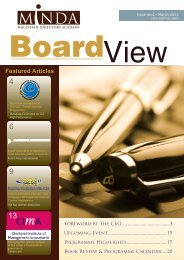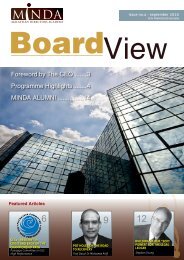September 2011 - MINDA Malaysian Directors Academy ...
September 2011 - MINDA Malaysian Directors Academy ...
September 2011 - MINDA Malaysian Directors Academy ...
Create successful ePaper yourself
Turn your PDF publications into a flip-book with our unique Google optimized e-Paper software.
article threeThe table above shows the findings of the researchers thatthe Board Managerial functions can be categorised into fourmain areas namely the decision making, planning, control,and board operation. With the exception of few functions,the rest are (i.e. the functions) equally agreed upon by theresearchers.Decision making on the eight strategic areas can be inferredas the choices which are concerned with the viable longterm health of the organisation. As the representativesof the owners/shareholders, board of directors have toanalyse and scrutinise the proposals submitted by theoperating management on the strategic areas in order toreach the decision best suited for the company.Planning can be considered a vital function of a companyboth as a method of adapting to market forces and as ameans of shaping the market and the total environment –the “what”. Boards of directors do not design or formulatethe planning system for the organisation, but by requiringthe operating management to submit or conduct long-termevaluation and forecasting of opportunities, boards areactually instituting planning requirements in the companies– the “how”. As more analysis is performed by boardsof directors on the activities of the company, there is agreater tendency to seek the best probable solution andan increased likelihood the company performance can beenhanced.The control function can encompass many different forms,including financial, human resources and administration.This function is meant to ensure that the company’sresources are utilised for tasks that are consistent withthe needs and goals of the company – the “what”. As suchboards of directors must be conversant with and fullyaware of what is going on in the company. By reviewingcurrent policies, programmes, and overall performance ofthe company, and by comparing the current results withthe budgeted and previous results, the “how”, boards ofdirectors can become conversant on the operation of thecompany.generalised that by performing these strategic functionseffectively, boards can ensure that the company is “doingthings right and doing the right thing”.The strategic management functions discussed abovewould contribute significantly to ensure that the companywould attain certain level of effectiveness. It is equallyimportant the boards of directors are conversant with theunderpinnings of company/organisational effectiveness.There is no one best criterion to assess company/organisational effectiveness, most researchers tend toagree the company/organisational effectiveness refersto the degree of long-term goal attainment. As such it isexpected that the boards of directors have to ensure thatthe companies always attain a high level of effectiveness.It is interesting to note that boards of directors can play aneffective role to ensure that the company is “doing thingsright and doing the right thing”. The above elaborationtends to answer the issue of “doing the right thing” whereboards of directors will perform the strategic managementfunctions which will lead for the company to have properstrategies, planning functions, control mechanisms andinformation flows. The strategic management functionsare well established discipline and the frameworks areeasily available. It is not surprised to notice most boards ofdirectors undertake the strategic management functionsbut the results tend to be diverse even in the same industryor sector. One of the main contributing reasons for this is“doing things right” is company specific unlike “doing theright thing”.It is argued that boards of directors that focus on “doingthe right thing” – the “what” satisfy their existence to be anecessary entity but not sufficient to justify their effectiveexistence. However, to make them relevant, boards ofdirectors have to focus on “doing things right” – the “how”besides “doing the right thing” – the “what”. “Doing thingsright” will differentiate between a dynamic and effectiveboards of directors and the ineffective boards of directors.9BOARD VIEW_SEPTEMBER <strong>2011</strong>Board’s operation refers to the manner in which boardswould organise themselves to perform their strategicmanagement functions for the company, the “what’. Boardsorganise themselves to secure information through formalor informal meeting, creation of committees to undertakespecific duties, to engage consultant to perform specifictasks which are relevant to the company. These functions,identified by the various researchers, are considered asstrategic roles of the board as they are identified as activitiesthat will ensure the existence of effective boards. It can beHow to be RelevantThe process to ensure the existence of a relevant boardstarts at the point of selection. It is essential that theNomination Committee of the board assesses the potentialcandidate to be a member of the board of the company.Some of the areas that should be considered are in terms ofthe person’s caliber, credibility and possesses the necessaryskills and experience to bring an independent judgment onthe issues of strategies, performance and resources of the6Drucker, P. Management: Tasks, Responsibilities, Practices, New York: Harper and Row Publishers, 1974.7Price, J.L., “The study of Organisational Effectiveness”, The Sociological Quarterly, Vol. 13 No. 1, Winter 1972, pp3-15; Mohr, L.B.,“The concept of organisational goals”, The American Political Science Review, Vol. 68 No. 2 June 1973, pp470-471.







